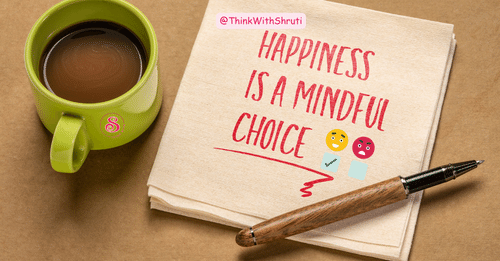Happiness is often thought of as the ultimate goal in life, the pot of gold at the end of the rainbow that we tirelessly chase. But what if happiness isn’t just a destination but a choice we make every day? What if it’s not something we find, but something we create within ourselves? This idea—that happiness is a choice—holds profound implications for how we navigate life’s ups and downs. This notion suggests that happiness is indeed a choice, rooted not in external circumstances but in the power of our own perspective.
Understanding Happiness
Happiness isn’t just about wearing a perpetual smile or experiencing unbridled joy every moment. It’s a deeper sense of contentment, fulfillment, and well-being that comes from within. It’s about feeling satisfied with life, having a sense of purpose, and experiencing moments of joy, even amidst life’s challenges.
At its core, happiness is a state of mind, a way of perceiving and experiencing the world around us. It’s like wearing a pair of glasses that tint our reality with shades of joy, contentment, and gratitude. While external factors certainly influence our emotions, such as achieving goals, experiencing success, or receiving love and validation, true happiness transcends these fleeting moments. It’s about finding joy in the ordinary, appreciating the beauty in the mundane, and cultivating a sense of inner peace and fulfillment regardless of external circumstances. Even helping others brings happiness to us.
Also read: Are you helpful? Know how you are benefiting.
The Power of Perspective
At the heart of the idea that happiness is a choice is the power of perspective. Imagine life as a series of events, each one presenting us with a choice: how we perceive and respond to it. When faced with difficulties—a setback at work, a disagreement with a loved one, or a personal challenge—we have the power to choose our response. We can either dwell on the negative aspects, allowing them to overshadow our entire outlook, or we can focus on the positives, finding silver linings and lessons to be learned. It’s like being handed a lemon and choosing whether to make lemonade or let it sour our mood.
One of the fundamental principles of happiness as a choice lies in our ability to control our thoughts and reactions. This is where the power of perspective comes into play. Imagine life as a canvas and our perspective as the paintbrush; we have the creative autonomy to choose the colors with which we paint our experiences. When faced with challenges or adversity, we can choose to dwell on the negatives, allowing them to overshadow our happiness, or we can choose to focus on the positives, finding silver linings amidst the storm. This doesn’t mean denying or invalidating our emotions; rather, it’s about acknowledging them and consciously choosing to respond with resilience, optimism, and hope.
Also read: Do You Know How To Manage Your Emotions And Why It Matters?
Cultivating Positive Habits
While our perspective plays a significant role in shaping our happiness, it’s not the only factor at play. Cultivating positive habits can also contribute to our overall sense of well-being. Regular exercise, for example, releases endorphins—those feel-good chemicals in our brains—that can boost our mood and reduce stress. Similarly, practicing gratitude, mindfulness, and acts of kindness can train our minds to focus on the good things in life, fostering a more positive outlook.
The Science of Happiness: Understanding the Hedonic Treadmill
In delving into the science of happiness, researchers in the field of positive psychology have uncovered fascinating insights into what truly contributes to our overall sense of well-being. One particularly intriguing concept that has emerged from this research is known as the “hedonic treadmill.”
The hedonic treadmill theory proposes that regardless of the highs and lows we experience in life, we tend to revert to a relatively stable level of happiness over time. Picture it like walking on a treadmill; no matter how fast or slow we go, we ultimately end up back at the starting point. Similarly, external events—whether positive or negative—may momentarily alter our happiness levels, but we eventually return to our baseline level of emotional well-being.
Can money buy happiness?
Money is honey, and money is awesome to support our lives. I totally support abundance and manifestation. But the important thing to understand is that it cannot give you peace of mind or your heart’s content. Money is carbohydrate, which satisfies your cravings but will not give you lean and sustainable weight loss. It will move the so-called satisfaction graph up and down like carbs play with your blood sugar levels. Consider the example of winning the lottery. While it may initially bring immense joy and excitement, studies have shown that lottery winners often return to their pre-lottery level of happiness after a period of time. On the flip side, experiencing a setback or adversity may temporarily lower our happiness levels, but we typically bounce back and adapt to our circumstances.

What’s fascinating about the hedonic treadmill is that it underscores the importance of our internal disposition in determining our long-term happiness. While external factors like wealth, success, or relationships can certainly influence our happiness in the short term, they are not the sole determinants of our overall well-being. Instead, it’s our internal mindset, attitudes, and habits that play a significant role in shaping our happiness over time.
This doesn’t mean that we’re doomed to a predetermined level of happiness for the rest of our lives. On the contrary, understanding the hedonic treadmill can empower us to take control of our own happiness. By cultivating positive habits, practicing gratitude, and nurturing supportive relationships, we can elevate our baseline level of happiness and create a more fulfilling life.
Also read: Sunshine State of Mind: How to Achieve?
Also read: Starting something New: Learn The Power of Imperfect Starts
Philosophical and Spiritual Perspectives: Embracing Inner Contentment
From the ancient Stoics to contemporary mindfulness practitioners, these teachings emphasize that true happiness emanates from within—the result of cultivating inner contentment and peace rather than seeking fulfillment in external possessions or achievements.
Stoic Philosophy
Ancient Stoic philosophers, such as Epictetus and Marcus Aurelius, proposed that happiness is not contingent upon external circumstances but rather on our perception and response to them. Stoicism teaches the importance of accepting the things we cannot change, cultivating gratitude for what we have, and focusing on the present moment. By aligning our desires with what is within our control and embracing the virtue of resilience in the face of adversity, Stoicism offers a practical roadmap to inner tranquility and fulfillment.
Eastern Spirituality and Hinduism
Similarly, Eastern spiritual traditions like Buddhism and Hinduism advocate for the cultivation of inner peace as the key to lasting happiness. Buddhist teachings emphasize the practice of mindfulness, compassion, and detachment from worldly attachments as means to transcend suffering and attain enlightenment. By letting go of craving and aversion and embracing the impermanent nature of existence, practitioners can experience a profound sense of inner freedom and joy.
Modern mindfulness practices draw upon these ancient traditions, offering practical tools for cultivating present-moment awareness and inner calm in everyday life. Mindfulness meditation, for example, teaches individuals to observe their thoughts and emotions with non-judgmental awareness, allowing them to respond to life’s challenges with equanimity and compassion. By training the mind to focus on the here and now, mindfulness enables individuals to break free from the cycle of rumination and anxiety, fostering a deeper sense of well-being and inner peace.
It’s about finding contentment in the present moment, embracing life’s imperfections, and recognizing the inherent beauty of existence. In doing so, we unlock the door to a life filled with meaning, purpose, and lasting fulfillment.
Also read: Finding Serenity in Imperfection: Navigating Perfectionism, OCD, and Embracing Wabi-Sabi Philosophy
Bottomline
In conclusion, while happiness may seem like an elusive goal, the truth is that it’s within our reach, waiting to be unlocked with the key of choice. By shifting our perspective, cultivating positive habits, and embracing timeless wisdom from various traditions, we can tap into a wellspring of happiness that flows from within. So the next time life throws you a curveball, remember: happiness is not just a destination—it’s a choice you make every day. Choose wisely, and watch as your life transforms into a tapestry of joy, purpose, and fulfillment.
References and Readings:
- “The Happiness Advantage” by Shawn Achor
- “The How of Happiness” by Sonja Lyubomirsky
- “The Art of Happiness” by Dalai Lama and Howard C. Cutler
- “Stumbling on Happiness” by Daniel Gilbert
- “The Power of Now” by Eckhart Tolle

